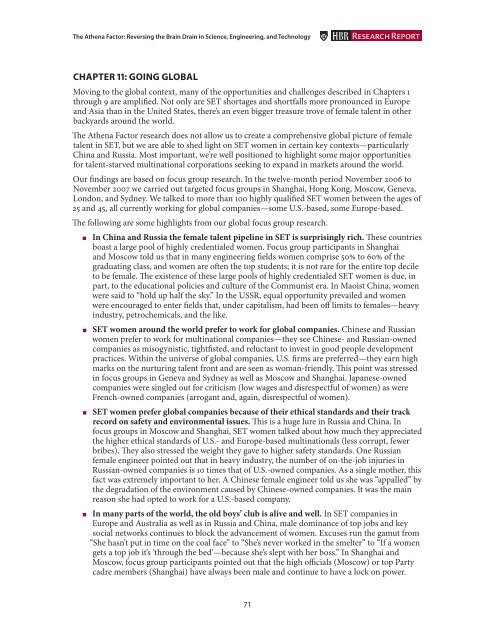HD6060-.A84-2008-PDF-Athena-factor-Reversing-the-brain-drain-in-science,-engineering,-and-technology
HD6060-.A84-2008-PDF-Athena-factor-Reversing-the-brain-drain-in-science,-engineering,-and-technology
HD6060-.A84-2008-PDF-Athena-factor-Reversing-the-brain-drain-in-science,-engineering,-and-technology
Create successful ePaper yourself
Turn your PDF publications into a flip-book with our unique Google optimized e-Paper software.
The <strong>A<strong>the</strong>na</strong> Factor: <strong>Revers<strong>in</strong>g</strong> <strong>the</strong> Bra<strong>in</strong> Dra<strong>in</strong> <strong>in</strong> Science, Eng<strong>in</strong>eer<strong>in</strong>g, <strong>and</strong> Technology<br />
HBR Research Report<br />
Chapter 11: Go<strong>in</strong>g Global<br />
Mov<strong>in</strong>g to <strong>the</strong> global context, many of <strong>the</strong> opportunities <strong>and</strong> challenges described <strong>in</strong> Chapters 1<br />
through 9 are amplified. Not only are SET shortages <strong>and</strong> shortfalls more pronounced <strong>in</strong> Europe<br />
<strong>and</strong> Asia than <strong>in</strong> <strong>the</strong> United States, <strong>the</strong>re’s an even bigger treasure trove of female talent <strong>in</strong> o<strong>the</strong>r<br />
backyards around <strong>the</strong> world.<br />
The <strong>A<strong>the</strong>na</strong> Factor research does not allow us to create a comprehensive global picture of female<br />
talent <strong>in</strong> SET, but we are able to shed light on SET women <strong>in</strong> certa<strong>in</strong> key contexts—particularly<br />
Ch<strong>in</strong>a <strong>and</strong> Russia. Most important, we’re well positioned to highlight some major opportunities<br />
for talent-starved mult<strong>in</strong>ational corporations seek<strong>in</strong>g to exp<strong>and</strong> <strong>in</strong> markets around <strong>the</strong> world.<br />
Our f<strong>in</strong>d<strong>in</strong>gs are based on focus group research. In <strong>the</strong> twelve-month period November 2006 to<br />
November 2007 we carried out targeted focus groups <strong>in</strong> Shanghai, Hong Kong, Moscow, Geneva,<br />
London, <strong>and</strong> Sydney. We talked to more than 100 highly qualified SET women between <strong>the</strong> ages of<br />
25 <strong>and</strong> 45, all currently work<strong>in</strong>g for global companies—some U.S.-based, some Europe-based.<br />
The follow<strong>in</strong>g are some highlights from our global focus group research.<br />
■<br />
■<br />
■<br />
■<br />
In Ch<strong>in</strong>a <strong>and</strong> Russia <strong>the</strong> female talent pipel<strong>in</strong>e <strong>in</strong> SET is surpris<strong>in</strong>gly rich. These countries<br />
boast a large pool of highly credentialed women. Focus group participants <strong>in</strong> Shanghai<br />
<strong>and</strong> Moscow told us that <strong>in</strong> many eng<strong>in</strong>eer<strong>in</strong>g fields women comprise 50% to 60% of <strong>the</strong><br />
graduat<strong>in</strong>g class, <strong>and</strong> women are often <strong>the</strong> top students; it is not rare for <strong>the</strong> entire top decile<br />
to be female. The existence of <strong>the</strong>se large pools of highly credentialed SET women is due, <strong>in</strong><br />
part, to <strong>the</strong> educational policies <strong>and</strong> culture of <strong>the</strong> Communist era. In Maoist Ch<strong>in</strong>a, women<br />
were said to “hold up half <strong>the</strong> sky.” In <strong>the</strong> USSR, equal opportunity prevailed <strong>and</strong> women<br />
were encouraged to enter fields that, under capitalism, had been off limits to females—heavy<br />
<strong>in</strong>dustry, petrochemicals, <strong>and</strong> <strong>the</strong> like.<br />
SET women around <strong>the</strong> world prefer to work for global companies. Ch<strong>in</strong>ese <strong>and</strong> Russian<br />
women prefer to work for mult<strong>in</strong>ational companies—<strong>the</strong>y see Ch<strong>in</strong>ese- <strong>and</strong> Russian-owned<br />
companies as misogynistic, tightfisted, <strong>and</strong> reluctant to <strong>in</strong>vest <strong>in</strong> good people development<br />
practices. With<strong>in</strong> <strong>the</strong> universe of global companies, U.S. firms are preferred—<strong>the</strong>y earn high<br />
marks on <strong>the</strong> nurtur<strong>in</strong>g talent front <strong>and</strong> are seen as woman-friendly. This po<strong>in</strong>t was stressed<br />
<strong>in</strong> focus groups <strong>in</strong> Geneva <strong>and</strong> Sydney as well as Moscow <strong>and</strong> Shanghai. Japanese-owned<br />
companies were s<strong>in</strong>gled out for criticism (low wages <strong>and</strong> disrespectful of women) as were<br />
French-owned companies (arrogant <strong>and</strong>, aga<strong>in</strong>, disrespectful of women).<br />
SET women prefer global companies because of <strong>the</strong>ir ethical st<strong>and</strong>ards <strong>and</strong> <strong>the</strong>ir track<br />
record on safety <strong>and</strong> environmental issues. This is a huge lure <strong>in</strong> Russia <strong>and</strong> Ch<strong>in</strong>a. In<br />
focus groups <strong>in</strong> Moscow <strong>and</strong> Shanghai, SET women talked about how much <strong>the</strong>y appreciated<br />
<strong>the</strong> higher ethical st<strong>and</strong>ards of U.S.- <strong>and</strong> Europe-based mult<strong>in</strong>ationals (less corrupt, fewer<br />
bribes). They also stressed <strong>the</strong> weight <strong>the</strong>y gave to higher safety st<strong>and</strong>ards. One Russian<br />
female eng<strong>in</strong>eer po<strong>in</strong>ted out that <strong>in</strong> heavy <strong>in</strong>dustry, <strong>the</strong> number of on-<strong>the</strong>-job <strong>in</strong>juries <strong>in</strong><br />
Russian-owned companies is 10 times that of U.S.-owned companies. As a s<strong>in</strong>gle mo<strong>the</strong>r, this<br />
fact was extremely important to her. A Ch<strong>in</strong>ese female eng<strong>in</strong>eer told us she was “appalled” by<br />
<strong>the</strong> degradation of <strong>the</strong> environment caused by Ch<strong>in</strong>ese-owned companies. It was <strong>the</strong> ma<strong>in</strong><br />
reason she had opted to work for a U.S.-based company.<br />
In many parts of <strong>the</strong> world, <strong>the</strong> old boys’ club is alive <strong>and</strong> well. In SET companies <strong>in</strong><br />
Europe <strong>and</strong> Australia as well as <strong>in</strong> Russia <strong>and</strong> Ch<strong>in</strong>a, male dom<strong>in</strong>ance of top jobs <strong>and</strong> key<br />
social networks cont<strong>in</strong>ues to block <strong>the</strong> advancement of women. Excuses run <strong>the</strong> gamut from<br />
“She hasn’t put <strong>in</strong> time on <strong>the</strong> coal face” to “She’s never worked <strong>in</strong> <strong>the</strong> smelter” to “If a women<br />
gets a top job it’s ‘through <strong>the</strong> bed’—because she’s slept with her boss.” In Shanghai <strong>and</strong><br />
Moscow, focus group participants po<strong>in</strong>ted out that <strong>the</strong> high officials (Moscow) or top Party<br />
cadre members (Shanghai) have always been male <strong>and</strong> cont<strong>in</strong>ue to have a lock on power.<br />
71


